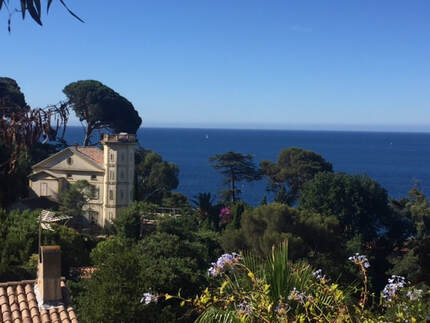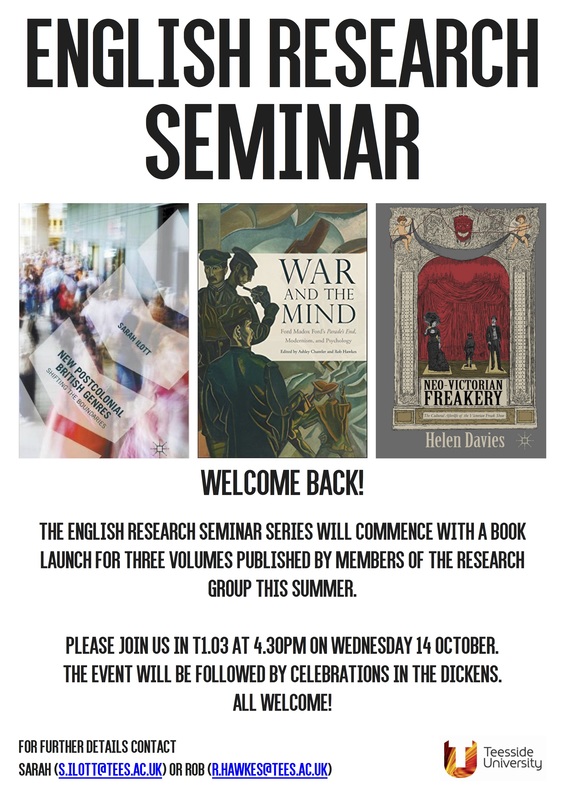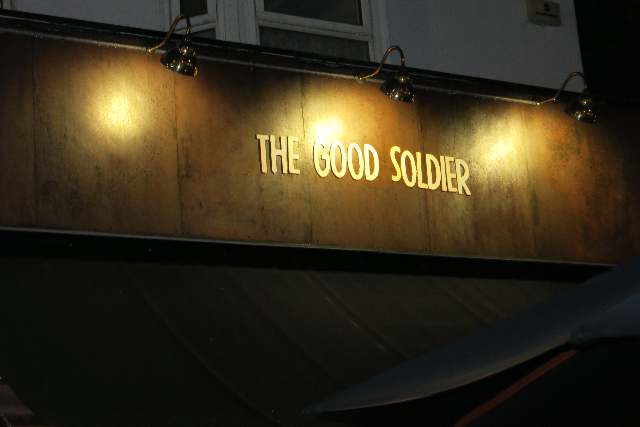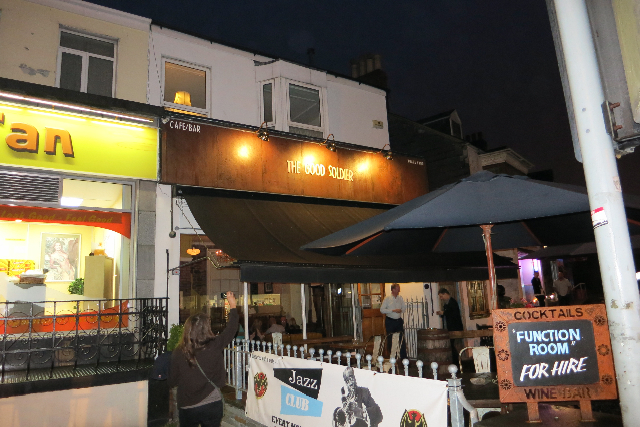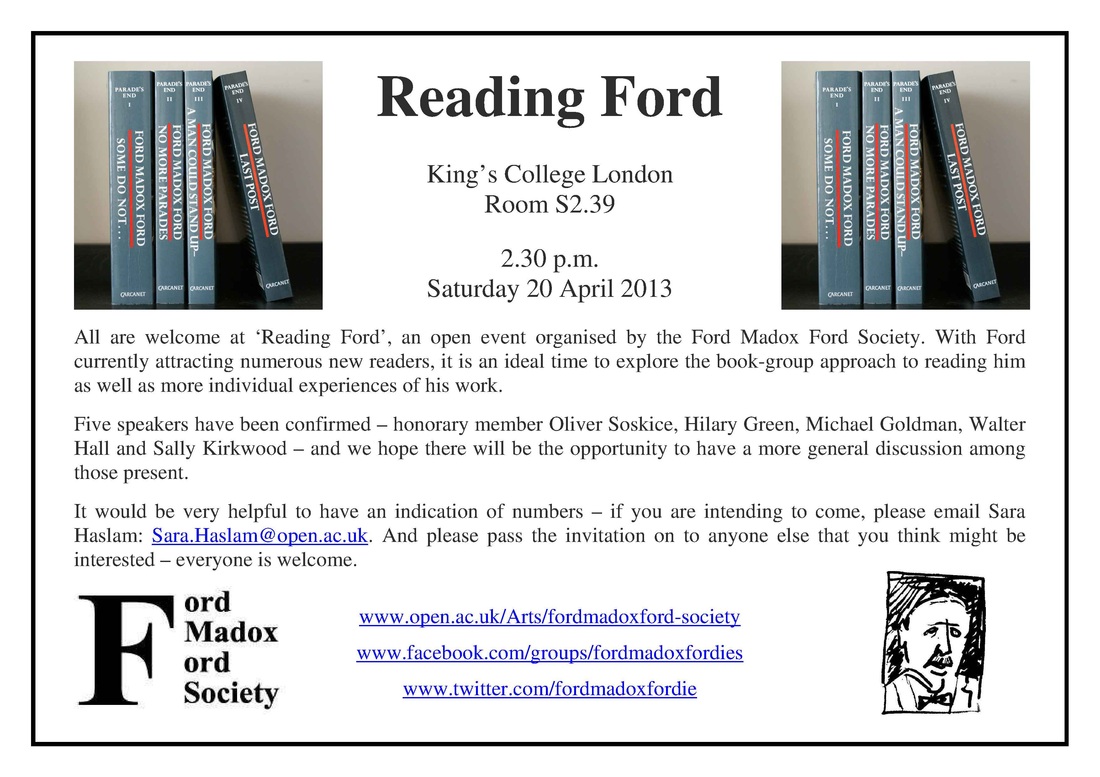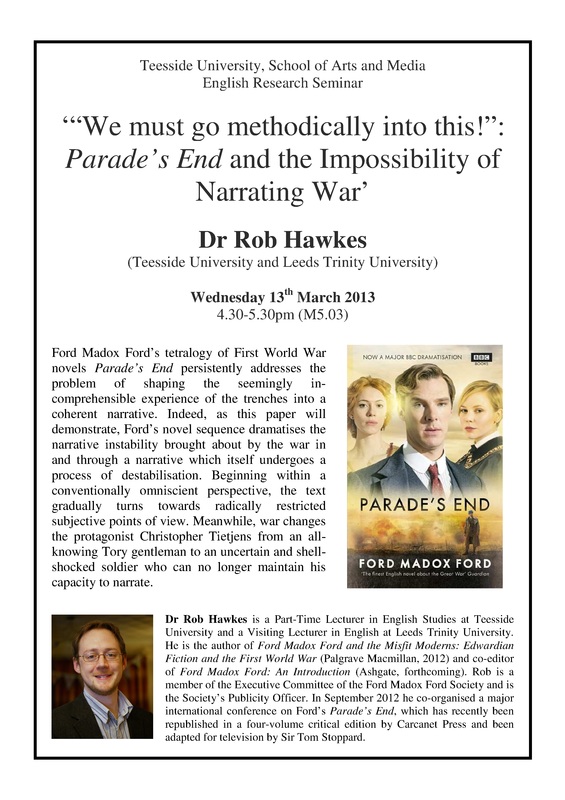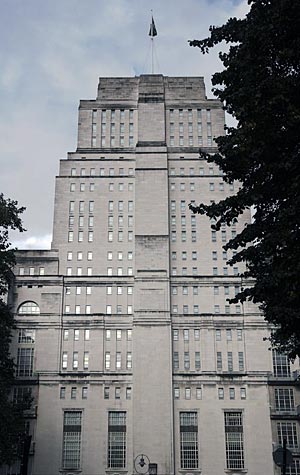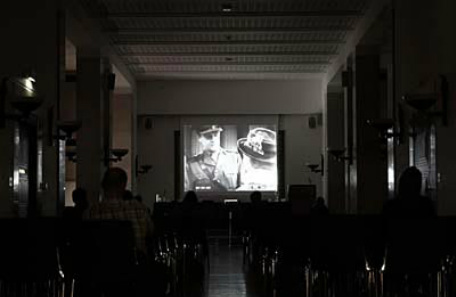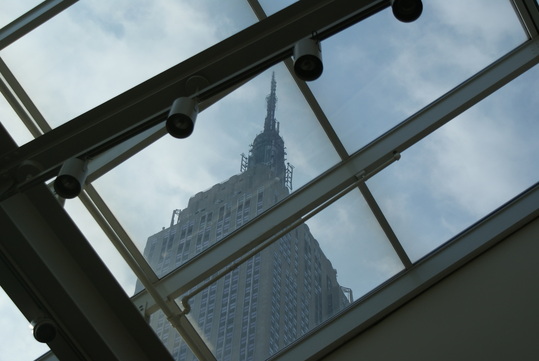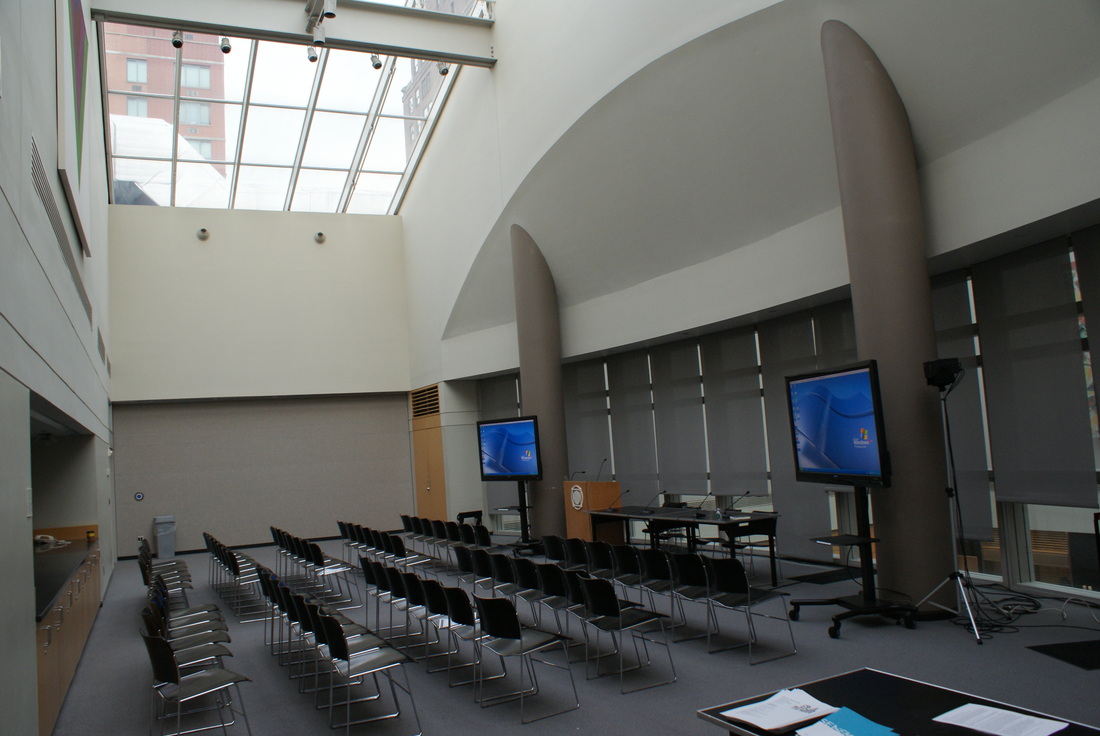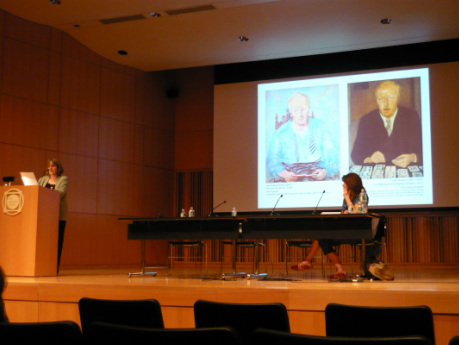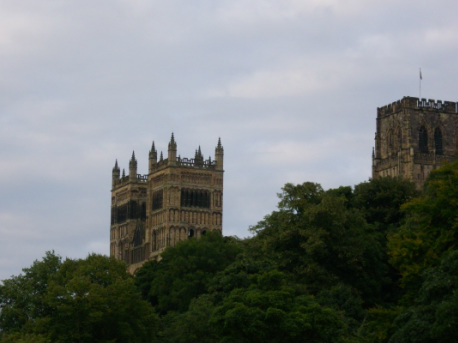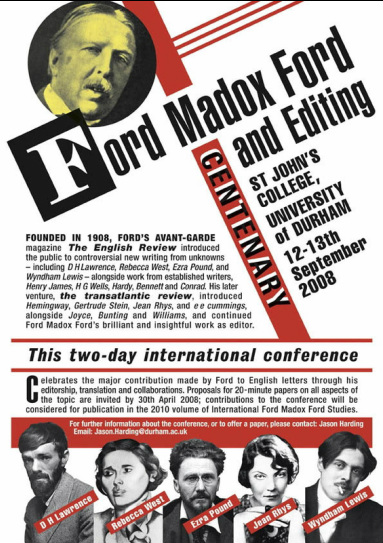Past Events Archive
‘Ford and Toulon: Biography, Culture and Environment in the 1920s and 1930s’
Université de Toulon, Ford Madox Ford Society
June 28-29, 2019
This conference brought together scholars working on Ford Madox Ford (1873-1939), a major twentieth-century novelist, editor and cultural commentator, forming part of a series of events celebrating writerly culture and experience in the city of Toulon, where Ford spent time in the 1920s and 1930s.
While there have been previous Ford Society conferences on the writer’s life in France, this venture represented an exciting opportunity to explore his life and work in Toulon, the heart of the literary Riviera, in the 1920s and 1930s. A recent event, in Montpellier, in September, 2017, organised by Isabelle Brasme, provided evidence of current French academic interest in Ford’s work, particularly among the postgraduate and early career community. Earlier French events led to volumes of essays, including Ford Madox Ford, France and Provence, ed. Dominique Lemarchal and Claire Davison-Pégon (Rodopi, 2011). The Toulon conference built on this interest, aiming in particular to broaden engagement with and knowledge of Ford’s work amongst younger scholars. To broaden relevance and reach further still, it was tied in with local tourist and cultural organisations, such as the "Académie du Var", as part of a promotion of culture and the arts in the local area.
The conference
Ford was in Toulon in 1925 as he was writing A Man Could Stand Up-, volume 3 of his First World War masterpiece, Parade’s End (1924-1928), and again in 1926. Recent biographical excursions have begun to establish the whereabouts of the studios he and Stella Bowen found and rented, and later lent to James Joyce, for example. Toulon was a heart of the literary and artistic Riviera in the 1920s and 1930s, and this conference proposes to explore Ford’s life and work at that heart, as well as the networks he nurtured while there - with Ezra Pound, for example, and numerous British and American expats and visitors. Other prominent writers close to Ford, like Joseph Conrad, spent time in or near Toulon, and this conference provided the opportunity to explore those relationships, and that location as a way of focusing on particularly important aspects of them, to do with the cultural life found in and created by traditions around food, for example, and the writers’ use of the French language. As Dominique Lemarchal has recently argued in an essay on Ford and Conrad, their communication in French was a crucial element of their writing lives.
CLICK HERE TO DOWNLOAD THE CONFERENCE PROGRAMME
Montpellier Conference, Ford Madox Ford and the Other, A Huge Success!
Sara Haslam writes: The Ford conference this year was held in a warm and sunny Montpellier, at the Université Paul-Valéry, and was organised by Isabelle Brasme, with support from colleagues at the university. Over two days we heard about alterity, intimacy, Germany, and the historical other in Ford’s works. Friendship and war, reading and therapy, autobiography and divorce, combined in biographical and critical analyses, and in discussions which continued over the excellent lunches and dinners.
Robert Hampson’s keynote, ‘Touch and Intimacy in The Good Soldier and Parade’s End’, was a fascinating exploration of the abundance of touching, coded and intolerable intimacies in Ford’s most famous texts, and changed how many of those in the audience will think about those books. The event concluded with a showing of ‘It Was the Nightingale’, Paul Lewis’ documentary film about Ford. In an email thanking Isabelle I noted: ‘There were many other highlights, too numerous to mention, but I do want to say how perfect it now seems to have concluded by hearing Ford’s voice. His careful, novelistic observation was tangible, and directed with empathy towards a fellow human, royal (and therefore very much an ‘other’) subject.’ Isabelle and her team did a fantastic job of organising this professionally inspiring and convivial event.
Isabelle Brasme writes: The conference welcomed attendants from all over the world – the United States, New Zealand, Dubai, the UK, the Netherlands, as well as researchers from all over France. The topic of the other sparked a rich variety of interpretations: aspects of psychology and psychoanalysis led to narratological analyses; several papers explored Ford’s links with other authors and the way in which Ford’s relationships – literary and amorous – served as catalyst for his writing. The questions of World War One and trauma, of the historical Other, and of Ford as an alien in Germany, also provided opportunities for captivating talks. The Good Soldier and Parade’s End were at the heart of many a discussion; however, lesser-known works, such as A Little Less than Gods or Ford’s poetry, were also fruitfully analysed, as were Ford’s letters.
Robert Hampson delivered a stellar keynote lecture revisiting The Good Soldier and Parade’s End through the paradigms of touch and intimacy, which gave a new and illuminating perspective on Ford’s writing. Paul Lewis generously allowed us a wonderful afternoon in the company of Ford with his film It Was the Nightingale, which was the perfect conclusion to these two days spent reflecting on Ford as homo duplex.
As conference organiser, I would like to give my warmest thanks to the scientific committee; to my local colleagues who helped ensure a smooth running of the event; to the attendants of the conference for allowing these few days to sustain and enrich the 'passionate dialogue' between fellow Fordians. Lastly, I shall remain forever indebted to Robert, whose keynote lecture will endure in my mind as one of the most inspiring and thrilling moments in my life as a Fordie; a true illumination.
Sara Haslam writes: Gill Gustar, a PhD student at King’s College, London, wrote of the event “As a first-timer to a Ford conference I had high expectations, all of which were met. The quality of presentations and discussions which followed them were uniformly high. The conference administration wonderfully blended professionalism with the personal touch. More than anything though, I felt part of an engaged, supportive and international academic community.” Fiona Houston, also a PhD student, at Aberdeen, blogged afterwards “it was a lovely, intimate conference with lots of supportive people.” She found the talks fascinating and went away from Montpellier with a both a reading list and a set of notes longer than she knows what to do with. We look forward to seeing how the conversations develop, into print, or in other ways.
Sara Haslam writes: The Ford conference this year was held in a warm and sunny Montpellier, at the Université Paul-Valéry, and was organised by Isabelle Brasme, with support from colleagues at the university. Over two days we heard about alterity, intimacy, Germany, and the historical other in Ford’s works. Friendship and war, reading and therapy, autobiography and divorce, combined in biographical and critical analyses, and in discussions which continued over the excellent lunches and dinners.
Robert Hampson’s keynote, ‘Touch and Intimacy in The Good Soldier and Parade’s End’, was a fascinating exploration of the abundance of touching, coded and intolerable intimacies in Ford’s most famous texts, and changed how many of those in the audience will think about those books. The event concluded with a showing of ‘It Was the Nightingale’, Paul Lewis’ documentary film about Ford. In an email thanking Isabelle I noted: ‘There were many other highlights, too numerous to mention, but I do want to say how perfect it now seems to have concluded by hearing Ford’s voice. His careful, novelistic observation was tangible, and directed with empathy towards a fellow human, royal (and therefore very much an ‘other’) subject.’ Isabelle and her team did a fantastic job of organising this professionally inspiring and convivial event.
Isabelle Brasme writes: The conference welcomed attendants from all over the world – the United States, New Zealand, Dubai, the UK, the Netherlands, as well as researchers from all over France. The topic of the other sparked a rich variety of interpretations: aspects of psychology and psychoanalysis led to narratological analyses; several papers explored Ford’s links with other authors and the way in which Ford’s relationships – literary and amorous – served as catalyst for his writing. The questions of World War One and trauma, of the historical Other, and of Ford as an alien in Germany, also provided opportunities for captivating talks. The Good Soldier and Parade’s End were at the heart of many a discussion; however, lesser-known works, such as A Little Less than Gods or Ford’s poetry, were also fruitfully analysed, as were Ford’s letters.
Robert Hampson delivered a stellar keynote lecture revisiting The Good Soldier and Parade’s End through the paradigms of touch and intimacy, which gave a new and illuminating perspective on Ford’s writing. Paul Lewis generously allowed us a wonderful afternoon in the company of Ford with his film It Was the Nightingale, which was the perfect conclusion to these two days spent reflecting on Ford as homo duplex.
As conference organiser, I would like to give my warmest thanks to the scientific committee; to my local colleagues who helped ensure a smooth running of the event; to the attendants of the conference for allowing these few days to sustain and enrich the 'passionate dialogue' between fellow Fordians. Lastly, I shall remain forever indebted to Robert, whose keynote lecture will endure in my mind as one of the most inspiring and thrilling moments in my life as a Fordie; a true illumination.
Sara Haslam writes: Gill Gustar, a PhD student at King’s College, London, wrote of the event “As a first-timer to a Ford conference I had high expectations, all of which were met. The quality of presentations and discussions which followed them were uniformly high. The conference administration wonderfully blended professionalism with the personal touch. More than anything though, I felt part of an engaged, supportive and international academic community.” Fiona Houston, also a PhD student, at Aberdeen, blogged afterwards “it was a lovely, intimate conference with lots of supportive people.” She found the talks fascinating and went away from Montpellier with a both a reading list and a set of notes longer than she knows what to do with. We look forward to seeing how the conversations develop, into print, or in other ways.
Ford Madox Ford and the Other
An International Conference organised by the Ford Madox Ford Society and EMMA (Études Montpelliéraines du Monde Anglophone)
Université Paul-Valéry de Montpellier,
Salle des Caryatides, Site Saint-Charles 2,
Rue de Professeur Henri Serre
Montpellier, France
8–9 September 2017
Programme
Friday 8 September
10:30 Ford Madox Ford International Society Annual General Meeting
13:00 Registration and welcome
13:30-15:00: Alterity in The Good Soldier
Chair: Christine Reynier
- Natalie Amiama: ‘Being Between’: the narrator in The Good Soldier
- Seamus O'Malley: Ford and Freud, Dowell and Dora
- Leslie De Bont: ‘I am so Near to All these People’: Alterity and the Fictions of the Self in Ford’s The Good Soldier and Sinclair’s Tasker Jevons
15:00-16:30: Ford and Others
Chair: Georges Letissier
- Harry Ricketts: The Great War and Othering the Self: Siegfried Sassoon and Ford Madox Ford
- Alice Baily Cheylan: Mutual Admiration and Discord: The friendship between Katherine Anne Porter and Ford Madox Ford
- Marine Bernot: The purpose of otherness in Ford Madox Ford and Anatole France’s autobiographical narratives
16:30-17:00 Refreshments
17:30-18:30: Keynote Lecture
Robert Hampson: Touch and intimacy in The Good Soldier and Parade's End
Chair: Sara Haslam
20:00: Conference Dinner: Le Grillardin, 3 Place de la Chapelle Neuve
Saturday 9 September
Morning Session
9:30-10:30: The Other in Ford’s Making
Chair: Isabelle Brasme
- Sara Haslam: The Other in Ford’s Making (1): Elsie, letters, fairy tales and the metadramatics of it all.
- Helen Chambers: The Other in Ford’s Making (2): Reader, Critic, Co-writer
10:30-11:00 Refreshments
11:00-12:30: Experiencing Alterity
Chair: Dominique Lemarchal
- Fiona Houston: Haunting the Reflective Consciousness: Ford Madox Ford, Time and The First World War
- Pia Dellson: Stoppard’s adaption of Parade’s End: Staging the Inarticulate Trauma
- Omar Sabbagh: Heavenly Others: Ford and the Strange ‘Impression’ of Transcendence
12:30 Lunch at Saint Charles (provided)
Afternoon Session
14:00-15:00: Ford’s Other Country: Germany
Chair: Harry Ricketts
- Zineb Berrahou: The Huefferian Years: Ford's Germany between greatness and illusion
- Lucinda Borkett Jones: Ford’s ‘German Period’: Constructing the German ‘Other’
15:00-15:30: Refreshments
15:30-16:30: The Historical Other
Chair: Robert Hampson
- Georges Letissier: Napoleonic Fiction Twinning: Ford Madox Ford’s A Little Less Than Gods (1928) and Joseph Conrad’s Suspense (1926)
- Laurence Davies: A Teeming of Alterities: Ford’s Historical Fiction
16:30: Presentation and Viewing of Paul Lewis’s film It Was the Nightingale
Introduced by Seamus O’Malley
War and the Mind: Ford Madox Ford's Parade's End, Modernism, and Psychology, edited by Ashley Chantler and Rob Hawkes, was celebrated at a triple book launch at Teesside University on 14 October 2015.
Literature at War: H.G. Wells, Ford Madox Ford and their Contemporaries in and around the First World War— 19 September, 2015
A report from Ford Society Chair, Dr. Sara Haslam
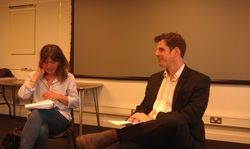 Sara Haslam and Guest Speaker, Sam Jordison in Conversation
Sara Haslam and Guest Speaker, Sam Jordison in Conversation
‘Literature at War: H.G. Wells, Ford Madox Ford and their Contemporaries in and around the First World War’ was held on 19 September at King’s College, London. This one-day event, which attracted 40 speakers and attendees, was sponsored by the Wells and Ford Societies, as well as the Centre for Modern Literature and Culture and the Centre for Life-Writing Research at King’s. After a warm welcome from Max Saunders, Sara Haslam’s keynote on literature and caregiving at war opened the proceedings. Her lecture was an historical and psychoanalytic analysis of reading at war; focusing on Ford and Wells, she explored why and how ‘literature thrived at the point of consumption, at the point of need’ during the war. The subsequent parallel panels divided into Wells and Ford at war, with themes and approaches including gender, genre, Ford and Lewis and, the biographical detail of Ford’s experience at the front (courtesy of Simon Gibbs, the only conference attendee whose father made an appearance in Parade’s End!).
The second keynote, by Bernard Loing, was a detailed and personal reading of Mr Britling and war as ‘inner experience’, via an introduction focused on Ernst Jünger’s view of war. Mr Britling was exceptional, Loing argued, because it was ‘the first time Wells is confronted with the real’ – although he never wanted to acknowledge the autobiographical nature of the book. Contributors to the parallel panels after lunch explored Turkish literature as propaganda, Flint, Ford and utopianism, and others of Wells’ war-time publications, including Boon. The final panel was a second exploration of the after-effects of war, with contributions on Thomas MacGreevey’s poetry and ‘abstract fiction’.
The day was brought to a close with a wonderful talk by Sam Jordison, Guardian journalist and Wells and Ford enthusiast. Sam ran an online book group on The Good Soldier for the Guardian in the spring of this year. When it emerged in the course of the resultant communication that he was also writing a book on H.G. Wells, Sara Haslam invited him to present at the conference. His romp through the internet world of ‘mis-information and myth’ surrounding these writers was a brilliant combination of personal insight and internet trawling as he considered where, if anywhere, ‘truth’ is to be found. The reception after this closing event was a lively affair, and thanks are due to King’s for providing excellent refreshments. The conference dinner was held at a local Turkish restaurant.
The second keynote, by Bernard Loing, was a detailed and personal reading of Mr Britling and war as ‘inner experience’, via an introduction focused on Ernst Jünger’s view of war. Mr Britling was exceptional, Loing argued, because it was ‘the first time Wells is confronted with the real’ – although he never wanted to acknowledge the autobiographical nature of the book. Contributors to the parallel panels after lunch explored Turkish literature as propaganda, Flint, Ford and utopianism, and others of Wells’ war-time publications, including Boon. The final panel was a second exploration of the after-effects of war, with contributions on Thomas MacGreevey’s poetry and ‘abstract fiction’.
The day was brought to a close with a wonderful talk by Sam Jordison, Guardian journalist and Wells and Ford enthusiast. Sam ran an online book group on The Good Soldier for the Guardian in the spring of this year. When it emerged in the course of the resultant communication that he was also writing a book on H.G. Wells, Sara Haslam invited him to present at the conference. His romp through the internet world of ‘mis-information and myth’ surrounding these writers was a brilliant combination of personal insight and internet trawling as he considered where, if anywhere, ‘truth’ is to be found. The reception after this closing event was a lively affair, and thanks are due to King’s for providing excellent refreshments. The conference dinner was held at a local Turkish restaurant.
AFTERMATH: the Cultural Legacies of WW1 — 21-23 May, 2015
The Arts & Humanities Research Institute at King’s, in conjunction with the Institute for the Arts and Humanities at the University of North Carolina, staged an international conference on the Cultural Legacies of World War I, held at King’s from 21-23 May 2015.
The conference covered a wide range of aspects of how the First World War changed the world, such as its geopolitical aftermath (and its current repercussions in the Middle East); how people thought about future wars; the war’s impact on social history, the arts and popular cultures, and on science, technology, nursing and medicine.
Report: At the 'Aftermath' conference at KCL on the Cultural Legacies of WW1 there were two panels devoted to FMF, with six papers by:
Andrew Frayn
Nur Karatas
Andrea Rummell
Krisztina Sárdi
Suzanne Steele
George Yeats
List of Other Speakers included:
Dr Santanu Das, Department of English, King’s College London
Prof. David Edgerton, Director, Centre for the History of Science, Technology and Medicine, King’s College London
Dr Kate McLoughlin, University of Oxford
Prof. Anne Marie Rafferty, Professor of Nursing Policy at the Florence Nightingale School of Nursing and Midwifery, King’s College London
Dr Eugene Rogan, Director, The Middle East Centre, St Antony's College, Oxford
Prof. Sir Simon Wessely, Vice Dean for Academic Psychiatry at the Institute of Psychiatry, Psychology & Neuroscience, King’s College London
The conference covered a wide range of aspects of how the First World War changed the world, such as its geopolitical aftermath (and its current repercussions in the Middle East); how people thought about future wars; the war’s impact on social history, the arts and popular cultures, and on science, technology, nursing and medicine.
Report: At the 'Aftermath' conference at KCL on the Cultural Legacies of WW1 there were two panels devoted to FMF, with six papers by:
Andrew Frayn
Nur Karatas
Andrea Rummell
Krisztina Sárdi
Suzanne Steele
George Yeats
List of Other Speakers included:
Dr Santanu Das, Department of English, King’s College London
Prof. David Edgerton, Director, Centre for the History of Science, Technology and Medicine, King’s College London
Dr Kate McLoughlin, University of Oxford
Prof. Anne Marie Rafferty, Professor of Nursing Policy at the Florence Nightingale School of Nursing and Midwifery, King’s College London
Dr Eugene Rogan, Director, The Middle East Centre, St Antony's College, Oxford
Prof. Sir Simon Wessely, Vice Dean for Academic Psychiatry at the Institute of Psychiatry, Psychology & Neuroscience, King’s College London
Ford Madox Ford, Parade's End and the Yorkshire Country Gentleman
Rob Hawkes
Poppleton Arts Society
The Poppleton Centre, Main Street, Upper Poppleton, York, YO26 6JT
24 March 2015, 7.30pm
Rob Hawkes
Poppleton Arts Society
The Poppleton Centre, Main Street, Upper Poppleton, York, YO26 6JT
24 March 2015, 7.30pm

Ford Madox Ford’s Parades End, which was adapted for television by Tom Stoppard in 2102, is the story of Christopher Tietjens, the youngest son of a Yorkshire country gentleman. While much recent discussion of the novel has focused on its status as 'the finest novel about the first World War' (Anthony Burgess), this talk will examine Tietjens as a Yorkshireman and consider Ford’s connections with the region.
What does Yorkshire represent in Ford’s great war novel and does being from Yorkshire help or hinder Tietjens in the trenches?
Dr Rob Hawkes is Senior Lecturer in English at Teesside University. He is author of Ford Madox Ford and the Misfit Moderns (Palgrave Macmillan, 2012) and co-editor of Ford Madox Ford's Parade's End: The First World War, Culture, and Modernity (Rodopi, 2015); War and the Mind: Ford Madox Ford's Parade's End, Modernism, and Psychology (Edinburgh University Press, forthcoming); and An Introduction to Ford Madox Ford (Ashgate, forthcoming).
What does Yorkshire represent in Ford’s great war novel and does being from Yorkshire help or hinder Tietjens in the trenches?
Dr Rob Hawkes is Senior Lecturer in English at Teesside University. He is author of Ford Madox Ford and the Misfit Moderns (Palgrave Macmillan, 2012) and co-editor of Ford Madox Ford's Parade's End: The First World War, Culture, and Modernity (Rodopi, 2015); War and the Mind: Ford Madox Ford's Parade's End, Modernism, and Psychology (Edinburgh University Press, forthcoming); and An Introduction to Ford Madox Ford (Ashgate, forthcoming).
Cosmopolis: Ford Madox Ford and the Cultures of Paris
An International Conference organised in association with the Ford Madox Ford Society,
Université Sorbonne Nouvelle – Paris 3, and Università degli Studi, Milano
Paris, France
11-13 September 2014
Université Sorbonne Nouvelle – Paris 3
Institut du Monde Anglophone
5, rue de l’École de Médecine
75 006 Paris
An International Conference organised in association with the Ford Madox Ford Society,
Université Sorbonne Nouvelle – Paris 3, and Università degli Studi, Milano
Paris, France
11-13 September 2014
Université Sorbonne Nouvelle – Paris 3
Institut du Monde Anglophone
5, rue de l’École de Médecine
75 006 Paris
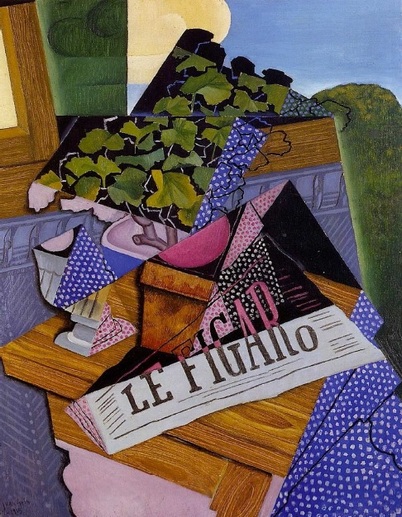 Juan Gris, Le Pot de geranium, 1915.
Oil on canvas. Private collection.
Juan Gris, Le Pot de geranium, 1915.
Oil on canvas. Private collection.
As in the case of many Anglo-American modernist and avant-garde writers, Paris features substantially in Ford’s narratives, criticism and recollections after having for many years offered him the familiarity of a home. But beyond the transnational encounter – experienced by quite a few of his colleagues – there is something exceptional, indeed unique, in Ford’s engagement with the French capital. A singularity due in the first place to the span of years which saw Ford busy exploring and enjoying the most exciting chapters of the lively and multiple cultures deployed in the city, from the late nineteenth century to the late 1930s. Rooted simultaneously in the long nineteenth century and in post-war effervescence, Ford’s Paris thus resonates on one hand with the voices of Flaubert and Maupassant and the colours of impressionism, featuring visitors such as Henry James, Whistler or George Moore but also exhibiting its scars and wounds with the Affaire Dreyfus; and on the other, it is the energetic and exuberant post-war capital of a new-born and often subversive artistic life experimenting with the diverse tools of words, images, music or the movies and struggling as well with the looming anxieties of crisis and depression. A bridge-builder between two crucial seasons in the cultures of Paris, Ford also acted as go-between and passeur, importing them in the dozing world of ‘Anglosaxondom’ and conversely introducing often reluctant French intellectuals to cross-Channel and cross-Atlantic artistic lives. As the extraordinary and short-lived adventure of the transatlantic review shows, Paris was both a fulcrum and the engine where new forms and languages were generated even if Ford was almost prophetically aware that the role of the city as a capital of culture would soon be on the wane.
The two-day conference started on Thursday 11th September 2014 and ended on Saturday 13th September 2014. The programme included a guided tour of Fordian and related locations in Paris as well as an exclusive screening of the documentary film, It Was the Nightingale. The Unreliable Story of Ford Madox Ford, directed by Paul Lewis.
Keynotes :
Georges Letissier (Université de Nantes): 'Paris fluctuat… Ford Madox Ford’s Urban Psychogeography'
Chris Tayler (London Review of Books): 'The Fat Man in History: Ford, Englishness and the Modernist Canon'
Click here to download the full conference programme.
Click here for abstracts and speaker biographies.
Click here to read a conference review by Helen Chambers
The two-day conference started on Thursday 11th September 2014 and ended on Saturday 13th September 2014. The programme included a guided tour of Fordian and related locations in Paris as well as an exclusive screening of the documentary film, It Was the Nightingale. The Unreliable Story of Ford Madox Ford, directed by Paul Lewis.
Keynotes :
Georges Letissier (Université de Nantes): 'Paris fluctuat… Ford Madox Ford’s Urban Psychogeography'
Chris Tayler (London Review of Books): 'The Fat Man in History: Ford, Englishness and the Modernist Canon'
Click here to download the full conference programme.
Click here for abstracts and speaker biographies.
Click here to read a conference review by Helen Chambers
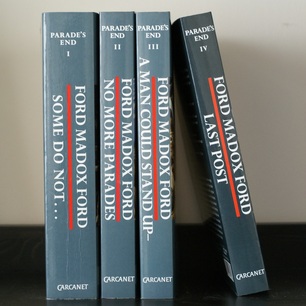
'Parade’s End – and Ford – Now!’, at BAMS 2014: ‘Modernism Now!’, 26–28 June 2014, Institute of English Studies, University of London
This panel considered Ford Madox Ford’s standing – within modernist studies and the culture at large – in 2014, focusing particularly on his First World War tetralogy Parade’s End. The Tietjens novels have received considerable attention in recent years for several reasons: a major critical edition of the tetralogy was published in 2010–11 by Carcanet Press, providing for the first time corrected texts, scholarly introductions, discussions of the textual histories, and detailed annotations; in 2012 a major international conference on Parade’s End gathered together more than 70 delegates from around the world at the IES, London; also in 2012, Sir Tom Stoppard’s five-part television adaptation of the novels, starring Benedict Cumberbatch, Rebecca Hall and Adelaide Clemens, aired on BBC2; and, as the First World War centenary approaches, readers and critics are increasingly being drawn to the book Anthony Burgess described as ‘the finest novel about the First World War’. Each of the papers examined Parade’s End today, either in the light of the new scholarly edition or the television adaptation, and in the context of the international community of Ford scholars represented by the Ford Madox Ford Society. Considering the ways in which this group of researchers has responded and will continue to respond to recent developments in Ford scholarship – and in the broader cultural conversation around Ford – allows us to reflect on Ford’s position as a modernist writer now as well as looking ahead to the future direction of Ford studies.
Papers:
For more information about the 'Modernism Now!' conference, please visit: http://www.ies.sas.ac.uk/events/ies-conferences/ModernismNow
This panel considered Ford Madox Ford’s standing – within modernist studies and the culture at large – in 2014, focusing particularly on his First World War tetralogy Parade’s End. The Tietjens novels have received considerable attention in recent years for several reasons: a major critical edition of the tetralogy was published in 2010–11 by Carcanet Press, providing for the first time corrected texts, scholarly introductions, discussions of the textual histories, and detailed annotations; in 2012 a major international conference on Parade’s End gathered together more than 70 delegates from around the world at the IES, London; also in 2012, Sir Tom Stoppard’s five-part television adaptation of the novels, starring Benedict Cumberbatch, Rebecca Hall and Adelaide Clemens, aired on BBC2; and, as the First World War centenary approaches, readers and critics are increasingly being drawn to the book Anthony Burgess described as ‘the finest novel about the First World War’. Each of the papers examined Parade’s End today, either in the light of the new scholarly edition or the television adaptation, and in the context of the international community of Ford scholars represented by the Ford Madox Ford Society. Considering the ways in which this group of researchers has responded and will continue to respond to recent developments in Ford scholarship – and in the broader cultural conversation around Ford – allows us to reflect on Ford’s position as a modernist writer now as well as looking ahead to the future direction of Ford studies.
Papers:
- Rob Hawkes (Teesside University): ‘It’s Going to Be Hard Work: Parade’s End and the Modernist Adaptation’
- Rebekah Lockyer (University of Birmingham): ‘Editing Ford’s Rhythms’
- Max Saunders (King’s College London): ‘Parade’s End, Editing, and 21st Century Ford’
For more information about the 'Modernism Now!' conference, please visit: http://www.ies.sas.ac.uk/events/ies-conferences/ModernismNow
The Northern Modernism Seminar
Modernism and Trust
Launch of the Cultures of Trust Network
Teesside University, Darlington Campus
Friday 2 May 2014
Modernism and Trust
Launch of the Cultures of Trust Network
Teesside University, Darlington Campus
Friday 2 May 2014
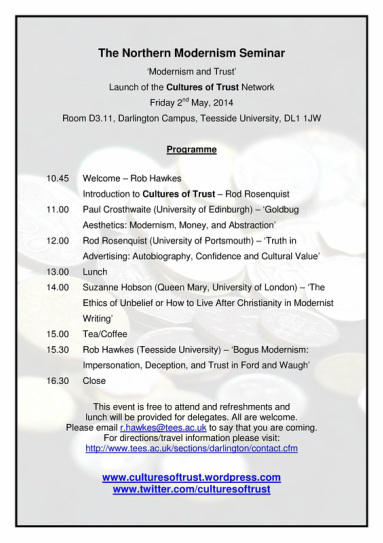 Click to download the programme
Click to download the programme
Rob Hawkes hosted the Spring Northern Modernism Seminar at Teesside University's Darlington Campus on Friday 2nd May 2014. Rob also gave a paper on Ford's The Rash Act and Evelyn Waugh's Vile Bodies, arguing that both might be regarded as examples of 'bogus modernism'.
The theme of the seminar was 'Modernism and Trust' and the Cultures of Trust research network was launched as part of the programme.
Venue: Room D3.11, Teesside University Darlington Campus, DL1 1JW
Time: 10:30am-4:30pm
Date: 2 May 2014
Cultures of Trust is an international interdisciplinary network of researchers with interests in the ideas of trust and distrust and in exploring intersecting issues such as risk, faith, confidence, authenticity, sincerity, money, modernity, and language and its (mis)uses. If you would like more information or would like to join the network, please visit: http://culturesoftrust.wordpress.com
The Northern Modernism Seminar is a bi-annual day event which moves between different locations in the (broadly conceived) north of the UK, designed to bring together scholars in the field of modernism. For more information, please visit: http://dorothyrichardson.org/NMS/
The theme of the seminar was 'Modernism and Trust' and the Cultures of Trust research network was launched as part of the programme.
Venue: Room D3.11, Teesside University Darlington Campus, DL1 1JW
Time: 10:30am-4:30pm
Date: 2 May 2014
Cultures of Trust is an international interdisciplinary network of researchers with interests in the ideas of trust and distrust and in exploring intersecting issues such as risk, faith, confidence, authenticity, sincerity, money, modernity, and language and its (mis)uses. If you would like more information or would like to join the network, please visit: http://culturesoftrust.wordpress.com
The Northern Modernism Seminar is a bi-annual day event which moves between different locations in the (broadly conceived) north of the UK, designed to bring together scholars in the field of modernism. For more information, please visit: http://dorothyrichardson.org/NMS/
FORD MADOX FORD SOCIETY
Exploratory Conference of the North American Chapter
New York City, NY
November 22-23, 2013
Exploratory Conference of the North American Chapter
New York City, NY
November 22-23, 2013
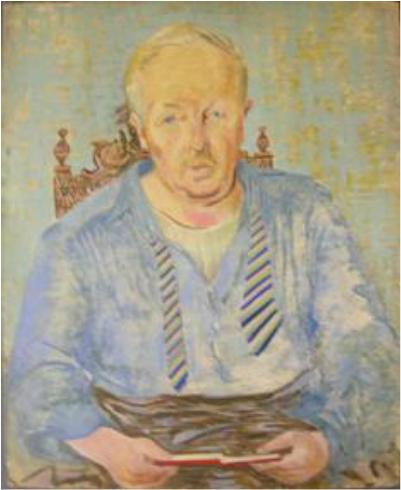 Janice Biala, Portrait of a Writer (Ford Madox Ford), 1938. Courtesy of the Estate of Janice Biala.
Janice Biala, Portrait of a Writer (Ford Madox Ford), 1938. Courtesy of the Estate of Janice Biala.
In November 2013, a conference was held to determine the viability of, and, if viable, the effective creation of a North American chapter of the International Ford Madox Ford Society.
thank yous for initial funding and partnership
Funding for this exploratory conference was provided by a matching grant from John Shannon & Jan Serr, and matched in part by the UK-based Ford Madox Ford Society. Helping to facilitate the organising is the Virginia-based nonprofit, Project 324.
working mission statement
... to promote the work and world of Ford Madox Ford and advance interest in the related arts to US, North American and global communities through creative programming, conversation and education.
The NA chapter will operate under the general guidance and leadership of the UK-based parent Ford Madox Ford Society, maintaining as principle goals integration and the collaborative experience.
thank yous for initial funding and partnership
Funding for this exploratory conference was provided by a matching grant from John Shannon & Jan Serr, and matched in part by the UK-based Ford Madox Ford Society. Helping to facilitate the organising is the Virginia-based nonprofit, Project 324.
working mission statement
... to promote the work and world of Ford Madox Ford and advance interest in the related arts to US, North American and global communities through creative programming, conversation and education.
The NA chapter will operate under the general guidance and leadership of the UK-based parent Ford Madox Ford Society, maintaining as principle goals integration and the collaborative experience.
'The Good Soldier Centenary Conference'
Organised in Association with the Ford Madox Ford Society
Swansea University
12-14 September 2013
Organised in Association with the Ford Madox Ford Society
Swansea University
12-14 September 2013
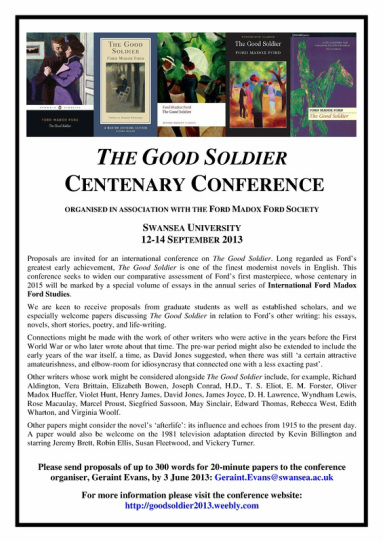 Click to download the poster
Click to download the poster
Delegates to this year’s Ford Madox Ford conference, held at Swansea University and organised (and designed) by Geraint Evans, were treated to 20 papers over two days by scholars from France, New Zealand, Istanbul, the US, Australia and the UK.
Together, along with a Keynote delivered by Peter Marks (’Under surveillance eyes: Wells, Orwell, and The Good Soldier’), and Catherine Belsey’s Ford Lecture (‘The Good Soldier, Ford’s postmodern novel’) they proved to this listener at least just how much remains to be said about Ford’s most well-known and widely-analysed novel.
Papers ranged from comparative readings of Ford’s novel alongside those of contemporaries (Kipling, James), to contextual analyses (Dowell as nurse, eugenics, sympathy and sentimentalism), to new examinations of genre, gender, form and, not surprisingly, the precise nature of Ford’s contribution to the concept and performance of the unreliable narrator.I think in the end we decided Dowell knew quite a lot!
We had the opportunity to consider the 1981 TV adaptation of The Good Soldier, and the camera’s contribution to exploding the myth of ‘good people’, as well as hormones, luggage fetishes, rabbits and poisons. It was a packed two days, and thanks are due to Geraint, as well as Helen, and also the team of helpers at Swansea for making it such an enjoyable, wide-ranging and stimulating conference.
Geraint’s design of the event will, I am sure, become legendary in Ford annals. He has significantly raised the bar as to what is required from site management.
Sara Haslam
Together, along with a Keynote delivered by Peter Marks (’Under surveillance eyes: Wells, Orwell, and The Good Soldier’), and Catherine Belsey’s Ford Lecture (‘The Good Soldier, Ford’s postmodern novel’) they proved to this listener at least just how much remains to be said about Ford’s most well-known and widely-analysed novel.
Papers ranged from comparative readings of Ford’s novel alongside those of contemporaries (Kipling, James), to contextual analyses (Dowell as nurse, eugenics, sympathy and sentimentalism), to new examinations of genre, gender, form and, not surprisingly, the precise nature of Ford’s contribution to the concept and performance of the unreliable narrator.I think in the end we decided Dowell knew quite a lot!
We had the opportunity to consider the 1981 TV adaptation of The Good Soldier, and the camera’s contribution to exploding the myth of ‘good people’, as well as hormones, luggage fetishes, rabbits and poisons. It was a packed two days, and thanks are due to Geraint, as well as Helen, and also the team of helpers at Swansea for making it such an enjoyable, wide-ranging and stimulating conference.
Geraint’s design of the event will, I am sure, become legendary in Ford annals. He has significantly raised the bar as to what is required from site management.
Sara Haslam
Ford at Stony Stratford Library 2013
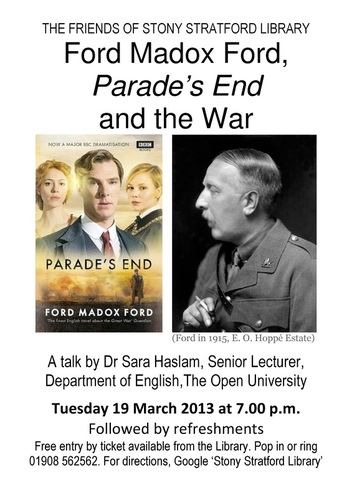 Click to download the flyer
Click to download the flyer
I was invited towards the end of 2012 to give a public lecture on Ford at Stony Stratford library. Stony is on the outskirts of Milton Keynes, and has always had strong links with the Open University. The lecture was to be one of the library’s regular public events, held monthly since the fight was won to keep the library open in the face of budget cuts. This campaign was nationally reported. The Friends of Stony Stratford Library orchestrated the taking out of 16,000 books in one week in January, 2011 to make closure impossible. It worked. (There’s a film on YouTube about the campaign - see below.)
I was delighted to be invited to speak about Ford in this community. The event, scheduled for March, 2013, sold out quickly – Parade’s End was very much in the air – and I had to beg an extra ticket for my mum. There were about 60 in the room to hear my lecture, ‘Ford Madox Ford, Parade’s End and the War’. I spoke for an hour on Ford, his influences, his route to war, and Parade’s End. The question and discussion session afterwards was very lively, covering everything from comparative studies of the war, to Ford’s characterisation, to his style, and life experiences.
Soon afterwards, I was asked to return in a slightly different capacity, to lead discussion of a Ford novel. The seminar, on The Good Soldier, was held on 12th November, with a group of 20 readers. We talked about whether we need to like first person narrators, and what happens if we don’t; we talked about religion, class, repression and sex. We also talked about genre, and this reader of Ford in particular took a great deal away from the discussion of melodrama, comic opera, and comedy.
Stony Stratford library is a vibrant, warm and exciting place. There’s an endless supply of tea and home-made cakes, as well as committed, energising and welcoming Friends, who keep the library operating in its highly rewarding capacity. I was invited for dinner with Judy and Richard after the seminar. There I learned how Margaret Thatcher had saved the Open University in 1972 (and despite Judy’s attempted intervention had been presented with her small son to admire on a visit to Stony in the 1980s), as well as (delicious irony) how strong a strain of communism and socialism ran in the university’s young veins. We discussed plots, the business of writing, and working with editors and agents over a good supper. Ford would have enjoyed all of it, I think, and I certainly did.
Sara Haslam
I was delighted to be invited to speak about Ford in this community. The event, scheduled for March, 2013, sold out quickly – Parade’s End was very much in the air – and I had to beg an extra ticket for my mum. There were about 60 in the room to hear my lecture, ‘Ford Madox Ford, Parade’s End and the War’. I spoke for an hour on Ford, his influences, his route to war, and Parade’s End. The question and discussion session afterwards was very lively, covering everything from comparative studies of the war, to Ford’s characterisation, to his style, and life experiences.
Soon afterwards, I was asked to return in a slightly different capacity, to lead discussion of a Ford novel. The seminar, on The Good Soldier, was held on 12th November, with a group of 20 readers. We talked about whether we need to like first person narrators, and what happens if we don’t; we talked about religion, class, repression and sex. We also talked about genre, and this reader of Ford in particular took a great deal away from the discussion of melodrama, comic opera, and comedy.
Stony Stratford library is a vibrant, warm and exciting place. There’s an endless supply of tea and home-made cakes, as well as committed, energising and welcoming Friends, who keep the library operating in its highly rewarding capacity. I was invited for dinner with Judy and Richard after the seminar. There I learned how Margaret Thatcher had saved the Open University in 1972 (and despite Judy’s attempted intervention had been presented with her small son to admire on a visit to Stony in the 1980s), as well as (delicious irony) how strong a strain of communism and socialism ran in the university’s young veins. We discussed plots, the business of writing, and working with editors and agents over a good supper. Ford would have enjoyed all of it, I think, and I certainly did.
Sara Haslam
Reading Ford
King’s College London
Room S2.39
2.30 p.m.
Saturday 20 April 2013
King’s College London
Room S2.39
2.30 p.m.
Saturday 20 April 2013
‘Reading Ford’, was an open event organised by the Ford Madox Ford Society in April 2013. Speakers included honorary member Oliver Soskice, Hilary Green, Michael Goldman, Walter Hall and Sally Kirkwood. With Ford attracting numerous new readers, it was an ideal time to explore the book-group approach to reading him as well as more individual experiences of his work.
‘“We must go methodically into this!”:
Parade’s End and the Impossibility of Narrating War’
Dr Rob Hawkes
(Teesside University and Leeds Trinity University)
Wednesday 13th March 2013
4.30-5.30pm (M5.05)
Parade’s End and the Impossibility of Narrating War’
Dr Rob Hawkes
(Teesside University and Leeds Trinity University)
Wednesday 13th March 2013
4.30-5.30pm (M5.05)
A talk by Dr Rob Hawkes, Part-Time Lecturer in English Studies at Teesside University and Visiting Lecturer in English at Leeds Trinity University. Download the flyer for full details. Follow this link for directions to the venue.
'Ford Madox Ford’s Parade's End: Modernism and the First World War'
27–29 September 2012
Institute of English Studies, University of London
27–29 September 2012
Institute of English Studies, University of London
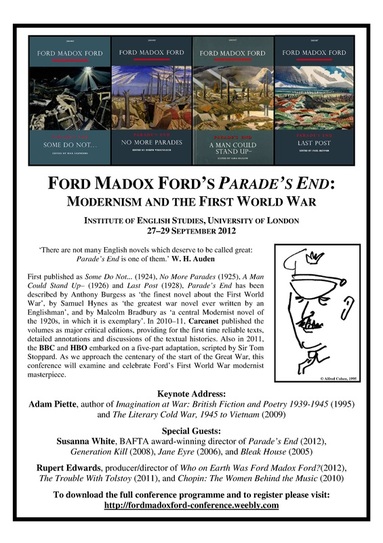 Click to download the poster
Click to download the poster
2012 proved to be an annus mirabilis for Ford and Fordians. The Good Soldier was published twice: Martin Stannard’s second Norton Critical Edition was followed by Max Saunders’s Oxford University Press edition. OUP also issued in paperback Max’s two-volume Ford Madox Ford: A Dual Life. Rodopi published the eleventh volume of International Ford Madox Ford Studies: Ford Madox Ford and America, edited by Sara Haslam and Seamus O’Malley (see the IFMFS page). Other publications engaging with Ford include Rob Hawkes’s Ford Madox Ford and the Misfit Moderns: Edwardian Fiction and the First World War, Nathan Waddell’s Modernist Nowheres: Politics and Utopia in Early Modernist Writing 1900–1920 (both Palgrave Macmillan), and Julian Barnes’s Through the Window: Seventeen Essays (and One Short Story) (Vintage).
In August–September, there was the brilliant five-part production – ‘one of the finest things the BBC has ever made’ (The Independent) – of Tom Stoppard’s adaptation ofParade’s End, directed by Susanna White, and the insightful, sensitive and at times moving Who on Earth Was Ford Madox Ford? A Culture Show Special, written, produced and directed by Rupert Edwards. A DVD of the television series has been released (it includes a ‘Behind the Scenes’ documentary), Dirk Brossé’s soundtrack is available digitally and on CD, and Faber has published Stoppard’s script (with an Introduction by the author and ‘bonus scenes’).
If all that was not enough, in September there was ‘Ford Madox Ford’s Parade’s End: Modernism and the First World War’, a three-day conference at the Institute of English Studies. Speakers and delegates came from around the world to discuss and celebrate Ford’s First World War modernist masterpiece.
Twenty-six very impressive papers were presented:
The Q&A was followed by a wine reception (sponsored by Carcanet Press, Oxford University Press and the Open University) and the launch of Carcanet’s four-volume critical edition of Parade’s End edited by Max Saunders (Some Do Not ...), Joseph Wiesenfarth (No More Parades), Sara Haslam (A Man Could Stand Up –), and Paul Skinner (Last Post). On the Saturday, the editors hosted a round-table discussion about the volumes.
Thanks to Max Saunders, delegates were treated to a screening of the three-part 1964 BBC adaptation of Parade’s End. A young Judi Dench presented a spirited, plucky Valentine but was outshone by Ronald Hines as Tietjens, who brought out the inner tensions of the character, and a scene with Sylvia (Jeanne Moody), in which she seemed to orgasm when thinking about her control over her husband, was remarkable.
On the Friday afternoon, the results of the ‘silent auction’ were announced. The family of Dr Jenny Plastow (friend, Fordian, and founding member of the Society) had kindly donated Jenny’s Ford-related books. The Society, whose funds have been significantly swelled, is sincerely grateful.
On the Friday evening, Society members gathered at Olivelli for the conference dinner, at which Joseph Wiesenfarth was presented a thank-you gift for his work over the years as US Treasurer. At the AGM on the Saturday, Seamus O’Malley accepted the nomination for the role.
Thanks to everyone who helped us over the three days, particularly the panel chairs John Attridge, Alexandra Becquet, Dominique Lemarchal, Seamus O’Malley, Gene Moore, Paul Skinner, Joseph Wiesenfarth, and Angus Wrenn. Special thanks must go to Charlotte Jones for running the bookstall and to Jon Millington at the IES for his help before, during and after the conference. Finally, thanks are due to everyone who attended and made the three days so enjoyable.
Ashley Chantler and Rob Hawkes, conference organisers
In August–September, there was the brilliant five-part production – ‘one of the finest things the BBC has ever made’ (The Independent) – of Tom Stoppard’s adaptation ofParade’s End, directed by Susanna White, and the insightful, sensitive and at times moving Who on Earth Was Ford Madox Ford? A Culture Show Special, written, produced and directed by Rupert Edwards. A DVD of the television series has been released (it includes a ‘Behind the Scenes’ documentary), Dirk Brossé’s soundtrack is available digitally and on CD, and Faber has published Stoppard’s script (with an Introduction by the author and ‘bonus scenes’).
If all that was not enough, in September there was ‘Ford Madox Ford’s Parade’s End: Modernism and the First World War’, a three-day conference at the Institute of English Studies. Speakers and delegates came from around the world to discuss and celebrate Ford’s First World War modernist masterpiece.
Twenty-six very impressive papers were presented:
- Christos Hadjiyannis (Institute of English Studies) – ‘Ford Madox Ford, T. E. Hulme and the First World War’.
- Rob Spence (Edge Hill University) – ‘Ford and Lewis: The Attraction of Opposites’.
- John Attridge (University of New South Wales) – ‘Englishness and Taciturnity in Parade’s End and Andre Maurois’s Les Silences du Colonel Bramble’.
- Seamus O’Malley (City University of New York) – ‘All That is Solid Turns to Mud: Parade’s End and the Liquidity of Landed Relations’.
- Austin Riede (North Georgia College and State University) – ‘“Cleaned, sand-dried bones”: Christopher Tietjens, Vera Brittain and the Anodyne of War’.
- Dominique Lemarchal (Université d’Angers) – ‘When I is Others: Parade’s End and the Impossibility of Autobiography’.
- John Benjamin Murphy (University of Virginia) – ‘“The ’ind legs of the elephink”: Pantomime, Prophecy and Tosh in Parade’s End’.
- Sara Haslam (Open University) – ‘“Hops, cannon, kettles and chimney backs”, or From Conversation to Humiliation: Parade’s End and the Eighteenth Century’.
- Christopher MacGowan (College of William and Mary) – ‘William Carlos Williams and Parade’s End’.
- Alec Marsh (Muhlenberg College) – ‘“Rossetti”, “Better Far” and Overcoming the Pre-Raphaelite Inheritance inSome Do Not … and The Good Soldier’.
- Joseph Wiesenfarth (University of Wisconsin-Madison) – ‘Death in the Wasteland: Ford, Wells and Waugh’.
- Michael Charlesworth (University of Texas at Austin) – ‘The View from Montagne Noir: Ford’s Panoramic Metaphor in No More Parades, No Enemy and It Was the Nightingale Compared to Works by J. R. R. Tolkien’.
- Liz Hodges (Merton College, University of Oxford) – ‘Sight and Scale in Parade’s End’.
- Alexandra Becquet (Université de la Sorbonne Nouvelle – Paris 3) – ‘Structure and Memory in Parade’s End: (De)Composing the War’.
- Barbara Farnworth (University of Rhode Island) – ‘The Self-Analysis of Christopher Tietjens’.
- Erin Kay Penner (Rothermere American Institute) – ‘Swearing by Ford’.
- Paul Skinner (Independent Scholar) – ‘Tietjens Walking, Ford Talking’.
- Sarah Kingston (University of Rhode Island/University of New Haven) – ‘“Sick bodies are of no use to the King”: Insomnia in British Literature of WWI’.
- Karolyn Steffens (University of Wisconsin-Madison) – ‘Freud Madox Ford: Parade’s End, Impressionism, and Psychoanalytic Trauma Theory’.
- Max Saunders (King’s College London) – ‘Sexuality, Sadism and Suppression in Parade’s End’.
- Tom Vandevelde (Katholieke Universiteit Leuven) – ‘“Are you going to mind the noise?”: Mapping the Soundscapes of Parade’s End’.
- Nathan Waddell (University of Nottingham) – ‘Ford Madox Ford’s Musical War’.
- Angus Wrenn (London School of Economics) – ‘The World-Ash and Groby Old Tree: Wagner and the Hueffers’.
- Eve Sorum (University of Massachusetts-Boston) – ‘Empathy, Trauma, and the Space of War in Parade’s End’.
- Meghan Hammond (New York University) – ‘Modernist Empathy in Ford’s Last Post’.
- Gene M. Moore (Universiteit van Amsterdam) – ‘Impressionism as Therapy’.
The Q&A was followed by a wine reception (sponsored by Carcanet Press, Oxford University Press and the Open University) and the launch of Carcanet’s four-volume critical edition of Parade’s End edited by Max Saunders (Some Do Not ...), Joseph Wiesenfarth (No More Parades), Sara Haslam (A Man Could Stand Up –), and Paul Skinner (Last Post). On the Saturday, the editors hosted a round-table discussion about the volumes.
Thanks to Max Saunders, delegates were treated to a screening of the three-part 1964 BBC adaptation of Parade’s End. A young Judi Dench presented a spirited, plucky Valentine but was outshone by Ronald Hines as Tietjens, who brought out the inner tensions of the character, and a scene with Sylvia (Jeanne Moody), in which she seemed to orgasm when thinking about her control over her husband, was remarkable.
On the Friday afternoon, the results of the ‘silent auction’ were announced. The family of Dr Jenny Plastow (friend, Fordian, and founding member of the Society) had kindly donated Jenny’s Ford-related books. The Society, whose funds have been significantly swelled, is sincerely grateful.
On the Friday evening, Society members gathered at Olivelli for the conference dinner, at which Joseph Wiesenfarth was presented a thank-you gift for his work over the years as US Treasurer. At the AGM on the Saturday, Seamus O’Malley accepted the nomination for the role.
Thanks to everyone who helped us over the three days, particularly the panel chairs John Attridge, Alexandra Becquet, Dominique Lemarchal, Seamus O’Malley, Gene Moore, Paul Skinner, Joseph Wiesenfarth, and Angus Wrenn. Special thanks must go to Charlotte Jones for running the bookstall and to Jon Millington at the IES for his help before, during and after the conference. Finally, thanks are due to everyone who attended and made the three days so enjoyable.
Ashley Chantler and Rob Hawkes, conference organisers
For further photos (courtesy of Alexandra Becquet), visit the 'Ford Madox Fordies' group on Facebook.
The conference website is at: Ford Madox Ford’s Parade’s End.
The conference website is at: Ford Madox Ford’s Parade’s End.
The Edwardian Ford Madox Ford:
Culture, Politics, and Gender
6-8 September 2011
Edwin Morgan Writing Centre, University of Glasgow
Culture, Politics, and Gender
6-8 September 2011
Edwin Morgan Writing Centre, University of Glasgow
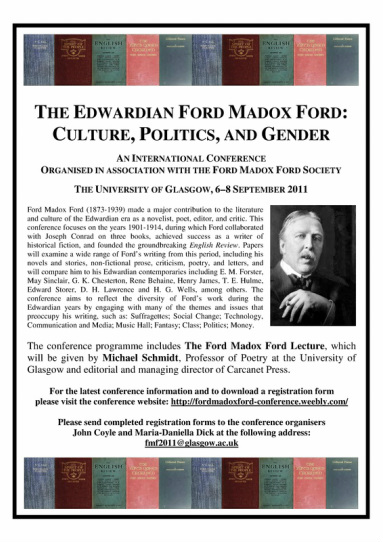 Click to download the poster
Click to download the poster
For the 2011 conference, a cohort of Ford scholars followed The Good Soldier’s Nancy in going to Glasgow. Held in the Edwin Morgan writing centre, the conference thus brought together two Carcanet writers in memory, and fell under the auspices of the late Professor of Poetry at the University of Glasgow. The aim was to situate the Edwardian Ford, focusing on the period 1901-1914, the years during which Ford founded the English Review and collaborated with Joseph Conrad; comparing Ford to other of his Edwardian contemporaries and placing him within the cultural periodisation, the papers presented a reconsideration of the Fordian corpus which did not claim it from Modernism but rather extended its influence.
Opening the conference, Geraint Evans, Andrew Frayn and Kate McLaughlin mobilised Ford, placing a call for a technological reading by, variously, comparison with Henry James’ use of electronic communication, by viewing the text in space and time, and through the trope of Ford’s ‘e-Rhetoric’.
The modern Edwardian continued with the second panel which, with Donald Mackenzie’s paper on utopian contexts for The Heart of the Country, considered an Edwardian mapping of the idyllic. The utopian tension between reality and fantasy was carried into Laurence Davies’ reading of ‘those queer effects of real life’ in Ford’s early fiction, and taken up by Birgit Van Puymbroeck’s positing of ‘The Novelist as Historian of His Own Time’, a comparison of Ford with René Behaine. Welcoming the Fordians to Glasgow at the evening reception, Nigel Leask, Regius Professor of English at Glasgow, then offered a witty account of the life of Ford’s great-great grandfather, John Brown, whose lectures were regularly enlivened by a balanced blend of whisky and laudanum. A Jura malt, untainted by any mixer, was thought sufficient for the toast which followed.
The next morning our third panel drew parallels between the early and late Edwardian; Leslie deBont spoke on the confessional affinity between the priest and the emerging figure of the analyst, bringing together A Call with May Sinclair’s Anne Severn and the Fieldings, while Maria-Daniella Dick performed a flight of fancy around the names of Ford Madox Ford and Stephen Dedalus. These followed Sara Haslam’s historicising of Ford through publishers, trends and markets, supplying a history of the book for the Edwardian period.
Max Saunders and Nisha Manocha explored imperial Ford in the fourth panel, respectively charting an ‘Empire of the Future’ in the imperialism and liberalism of The Inheritors and viewing The Good Soldier in its genetic context, ‘Documenting The Good Soldier’.
Returning to the metropolis, the sixth panel advocated a reconsideration of Ford’s Edwardian city poetry, Jess Owen examining the place of voice and speech in the Collected Poems of 1913 and Tim Freeborn the theme of Urban Impressionism in Ford, Harold Monro and Douglas Goldring.
The second day ended with The Ford Madox Ford Lecture, delivered by the University of Glasgow’s present Professor of Poetry, Michael Schmidt. A writer-editor himself, executor of the Ford Estate and publisher of Ford in his role as founder and editor of Carcanet Press, Michael spoke with winning erudition of Ford as the ‘Good Collaborator’ who spanned generations, cultures and continents, and in passing offered many of us new insights - not to mention inside information - into the arcane ways of the Savile club as hub of the Edwardian literary world. The evening drinks and conference dinner took a Gaelic turn, being held at Oran Mor – with a passing glimpse of Alasdair Gray– and Cail Bruaich.
The final day of the conference began with a penultimate panel that returned to fantastical Ford, Nick Hubble presenting on ‘The Condition of Edwardian England in Ford’s Fantasies’, while Kristin Gifford, in her paper ‘“Are you the chap who rang up 4,529 Mayfair?”: Class Anxiety Made Ridiculous in Ford’s A Call’, addressed both an early theme of the conference and a novel which received much critical attention over the three days, centralising their concerns around that text. The final panel concluded the day, with papers by Venetia Abdalla, who took up the ‘That Neurasthenia Joke’ in order to examine approaches to degeneration and eugenics in Ford and Violet Hunt, and Joseph Wiesenfarth who brought the event to a fine conclusion by placing Ford in context alongside E. M. Forster. Besides the high quality of individual contributions, the conference was notable for the running conversation between papers which lent the occasion a rare sense of intellectual coherence as well as conviviality.
The conference ended with an informal tour of the West End’s second-hand bookshops for those who lingered on for the afternoon, keen, unlike Nancy, to stay on in Glasgow.
John Coyle and Maria Dick, conference organisers
Opening the conference, Geraint Evans, Andrew Frayn and Kate McLaughlin mobilised Ford, placing a call for a technological reading by, variously, comparison with Henry James’ use of electronic communication, by viewing the text in space and time, and through the trope of Ford’s ‘e-Rhetoric’.
The modern Edwardian continued with the second panel which, with Donald Mackenzie’s paper on utopian contexts for The Heart of the Country, considered an Edwardian mapping of the idyllic. The utopian tension between reality and fantasy was carried into Laurence Davies’ reading of ‘those queer effects of real life’ in Ford’s early fiction, and taken up by Birgit Van Puymbroeck’s positing of ‘The Novelist as Historian of His Own Time’, a comparison of Ford with René Behaine. Welcoming the Fordians to Glasgow at the evening reception, Nigel Leask, Regius Professor of English at Glasgow, then offered a witty account of the life of Ford’s great-great grandfather, John Brown, whose lectures were regularly enlivened by a balanced blend of whisky and laudanum. A Jura malt, untainted by any mixer, was thought sufficient for the toast which followed.
The next morning our third panel drew parallels between the early and late Edwardian; Leslie deBont spoke on the confessional affinity between the priest and the emerging figure of the analyst, bringing together A Call with May Sinclair’s Anne Severn and the Fieldings, while Maria-Daniella Dick performed a flight of fancy around the names of Ford Madox Ford and Stephen Dedalus. These followed Sara Haslam’s historicising of Ford through publishers, trends and markets, supplying a history of the book for the Edwardian period.
Max Saunders and Nisha Manocha explored imperial Ford in the fourth panel, respectively charting an ‘Empire of the Future’ in the imperialism and liberalism of The Inheritors and viewing The Good Soldier in its genetic context, ‘Documenting The Good Soldier’.
Returning to the metropolis, the sixth panel advocated a reconsideration of Ford’s Edwardian city poetry, Jess Owen examining the place of voice and speech in the Collected Poems of 1913 and Tim Freeborn the theme of Urban Impressionism in Ford, Harold Monro and Douglas Goldring.
The second day ended with The Ford Madox Ford Lecture, delivered by the University of Glasgow’s present Professor of Poetry, Michael Schmidt. A writer-editor himself, executor of the Ford Estate and publisher of Ford in his role as founder and editor of Carcanet Press, Michael spoke with winning erudition of Ford as the ‘Good Collaborator’ who spanned generations, cultures and continents, and in passing offered many of us new insights - not to mention inside information - into the arcane ways of the Savile club as hub of the Edwardian literary world. The evening drinks and conference dinner took a Gaelic turn, being held at Oran Mor – with a passing glimpse of Alasdair Gray– and Cail Bruaich.
The final day of the conference began with a penultimate panel that returned to fantastical Ford, Nick Hubble presenting on ‘The Condition of Edwardian England in Ford’s Fantasies’, while Kristin Gifford, in her paper ‘“Are you the chap who rang up 4,529 Mayfair?”: Class Anxiety Made Ridiculous in Ford’s A Call’, addressed both an early theme of the conference and a novel which received much critical attention over the three days, centralising their concerns around that text. The final panel concluded the day, with papers by Venetia Abdalla, who took up the ‘That Neurasthenia Joke’ in order to examine approaches to degeneration and eugenics in Ford and Violet Hunt, and Joseph Wiesenfarth who brought the event to a fine conclusion by placing Ford in context alongside E. M. Forster. Besides the high quality of individual contributions, the conference was notable for the running conversation between papers which lent the occasion a rare sense of intellectual coherence as well as conviviality.
The conference ended with an informal tour of the West End’s second-hand bookshops for those who lingered on for the afternoon, keen, unlike Nancy, to stay on in Glasgow.
John Coyle and Maria Dick, conference organisers
'Ford Madox Ford and America'
23rd-25th September, 2010
CUNY Graduate Center, 365 Fifth Avenue
NY
23rd-25th September, 2010
CUNY Graduate Center, 365 Fifth Avenue
NY
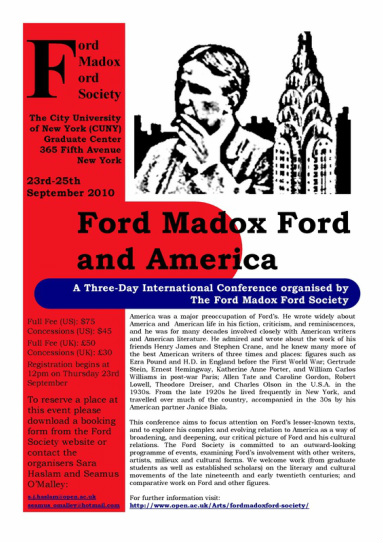 Click to download the poster
Click to download the poster
The conference opened on a beautiful September afternoon, in an amazing location. The skylight room of the Graduate Center, at CUNY, offered an up-close view of the Empire State Building through its glass roof, impressively suggestive of windows, perspective, and vertical living in general, all ideas that would recur.
The opening panel compared James, Wells, and Ford in differing combinations. Papers by Angus Wrenn and Joseph Wiesenfarth considered the alienating modern metropolis as constructed by the ‘Rye group’, and looked at the essentially different responses to the First World War in James, Wells and Ford. Cosmopolitanism, which proved a touchstone throughout the conference, received its first treatment as an example of James’ and Ford’s differing political and cultural perspectives.
The second panel explored the role of American identity in several of Ford’s fictions. Sara Haslam examined aspects of physical space, from cities to war trenches, and noted how Ford builds his characters through travel. New York was assessed for its biographical importance to Ford, as well as its role (from financial powerhouse to ‘good time’ city) in his fiction. Adra Raine argued that The Good Soldier was a work of “total fiction,” and not, as is most commonly read, a drama of an epistemological crisis. Dowell thus has an American identity, but it is purely fictional and constructed. Anne-Marie Flanagan re-examined The Half-Moon, noting that it is more about the Old World than the New.
On Friday morning, the conference began with papers from Christopher GoGwilt and Patrick Deer, who examined Ford’s place in genealogies of English modernism, and transatlantic modernism, with particular reference to war. It Was the Nightingale and the transatlantic review featured prominently in each account, as did Ford’s critique of Englishness, both refracted through the idiosyncratic primacy of Fordian memory. GoGwilt explored the ambiguity of Englishness as manifested in Ford’s work as editor, and Deer similarly reads the transatlantic as a highly unstable place.
Panel 4 brought together papers with a sociological and political bent. Stan Green analysed Ford’s attempts to disentangle imagism from impressionism (preferably also upstaging Pound), using some provocative images to illustrate his discussion of two important dinners which took place two days apart in July 1914: one to celebrate Vorticism, the other Imagism. Meghan Hammond unpacked the 15 issues of Ford’s English Review to reveal that the apparently slight transatlantic interest is in fact made much more rich and complex with detailed study of James’ ‘The Jolly Corner’. One purpose of the English Review was to ‘overcome strange ignorances’. Ford wrote that editorial before James wrote his story, but Hammond’s paper examined the interest in the American mind fundamental to James’ text alongside ideas about American individualism propounded in Dickinson’s Letters from America series. Gene Moore’s paper tackled the legacy of slavery in the Great Trade Route. Beginning with Ford’s letter to Stella Bowen in which he described being ‘buried among southerners’ at the Tates in the West Village in 1927, Moore proceeded to explore what exactly Ford meant by various ‘souths’, how this affected his art, and why he was less programmatic in his politics regarding slavery in particular, than some of the women in his life.
In the last panel, Ford’s When the Wicked Man, and the New York context – chaos, claustrophobia, sexual incontinence and violence, financial and commercial energies – were re-introduced. While Elizabeth Foley brought Ford’s constructions of masculinity and femininity under scrutiny (partly via Jean Rhys), Rob Hawkes addressed the boundaries between fiction and autobiography in Stein’s ‘lost generation’, with a particular interest in the intertextual relationships between Hemingway and Ford. Bob McDonough’s paper offered a treatment of When the Wicked Man that reads it as an unsuccessful grafting of a depiction of the protagonist’s consciousness onto an American adventure story.
The Ford Madox Ford lecture was delivered by the novelist Mary Gordon. Best known for her novels and memoirs, Gordon also teaches creative writing at Barnard College. Her illustrated talk offered an evocative and persuasive examination of the different, and shared, impressionism of Ford and Janice Biala. Their ‘habit of response’ and ‘passionate dialogue’ were seen as the basis of a characteristic mode in both artist and novelist, which sustained them. Each could be rooted in Biala’s background in, and Ford’s ideas about, New York. Gordon took questions afterwards, in which she was asked what aspects of Ford’s technique she had found most influential as a writer and more on her views about Ford’s relationships with other women artists. The discussion developed into one about genre, and the boundaries between fiction and non-fiction in particular, and concluded with further details as to Gordon’s responses to Biala’s art.
Saturday morning offered a rare conference treat. Jason Andrew, representative of the Biala estate, opened a room at the Tibor Nagy gallery, further up Fifth Avenue, for a private view. Biala’s paintings and drawings were on view, as was a bound copy of Ford’s handwritten Buckshee Poems, and Biala’s copy of the Collected Poems, inscribed by Ford, but with a poem by William Johnson Cory copied out in the front by Biala, on June 26th, 1940, a year after Ford’s death.
Sara Haslam and Seamus O’Malley, conference organisers.
October, 2010.
The opening panel compared James, Wells, and Ford in differing combinations. Papers by Angus Wrenn and Joseph Wiesenfarth considered the alienating modern metropolis as constructed by the ‘Rye group’, and looked at the essentially different responses to the First World War in James, Wells and Ford. Cosmopolitanism, which proved a touchstone throughout the conference, received its first treatment as an example of James’ and Ford’s differing political and cultural perspectives.
The second panel explored the role of American identity in several of Ford’s fictions. Sara Haslam examined aspects of physical space, from cities to war trenches, and noted how Ford builds his characters through travel. New York was assessed for its biographical importance to Ford, as well as its role (from financial powerhouse to ‘good time’ city) in his fiction. Adra Raine argued that The Good Soldier was a work of “total fiction,” and not, as is most commonly read, a drama of an epistemological crisis. Dowell thus has an American identity, but it is purely fictional and constructed. Anne-Marie Flanagan re-examined The Half-Moon, noting that it is more about the Old World than the New.
On Friday morning, the conference began with papers from Christopher GoGwilt and Patrick Deer, who examined Ford’s place in genealogies of English modernism, and transatlantic modernism, with particular reference to war. It Was the Nightingale and the transatlantic review featured prominently in each account, as did Ford’s critique of Englishness, both refracted through the idiosyncratic primacy of Fordian memory. GoGwilt explored the ambiguity of Englishness as manifested in Ford’s work as editor, and Deer similarly reads the transatlantic as a highly unstable place.
Panel 4 brought together papers with a sociological and political bent. Stan Green analysed Ford’s attempts to disentangle imagism from impressionism (preferably also upstaging Pound), using some provocative images to illustrate his discussion of two important dinners which took place two days apart in July 1914: one to celebrate Vorticism, the other Imagism. Meghan Hammond unpacked the 15 issues of Ford’s English Review to reveal that the apparently slight transatlantic interest is in fact made much more rich and complex with detailed study of James’ ‘The Jolly Corner’. One purpose of the English Review was to ‘overcome strange ignorances’. Ford wrote that editorial before James wrote his story, but Hammond’s paper examined the interest in the American mind fundamental to James’ text alongside ideas about American individualism propounded in Dickinson’s Letters from America series. Gene Moore’s paper tackled the legacy of slavery in the Great Trade Route. Beginning with Ford’s letter to Stella Bowen in which he described being ‘buried among southerners’ at the Tates in the West Village in 1927, Moore proceeded to explore what exactly Ford meant by various ‘souths’, how this affected his art, and why he was less programmatic in his politics regarding slavery in particular, than some of the women in his life.
In the last panel, Ford’s When the Wicked Man, and the New York context – chaos, claustrophobia, sexual incontinence and violence, financial and commercial energies – were re-introduced. While Elizabeth Foley brought Ford’s constructions of masculinity and femininity under scrutiny (partly via Jean Rhys), Rob Hawkes addressed the boundaries between fiction and autobiography in Stein’s ‘lost generation’, with a particular interest in the intertextual relationships between Hemingway and Ford. Bob McDonough’s paper offered a treatment of When the Wicked Man that reads it as an unsuccessful grafting of a depiction of the protagonist’s consciousness onto an American adventure story.
The Ford Madox Ford lecture was delivered by the novelist Mary Gordon. Best known for her novels and memoirs, Gordon also teaches creative writing at Barnard College. Her illustrated talk offered an evocative and persuasive examination of the different, and shared, impressionism of Ford and Janice Biala. Their ‘habit of response’ and ‘passionate dialogue’ were seen as the basis of a characteristic mode in both artist and novelist, which sustained them. Each could be rooted in Biala’s background in, and Ford’s ideas about, New York. Gordon took questions afterwards, in which she was asked what aspects of Ford’s technique she had found most influential as a writer and more on her views about Ford’s relationships with other women artists. The discussion developed into one about genre, and the boundaries between fiction and non-fiction in particular, and concluded with further details as to Gordon’s responses to Biala’s art.
Saturday morning offered a rare conference treat. Jason Andrew, representative of the Biala estate, opened a room at the Tibor Nagy gallery, further up Fifth Avenue, for a private view. Biala’s paintings and drawings were on view, as was a bound copy of Ford’s handwritten Buckshee Poems, and Biala’s copy of the Collected Poems, inscribed by Ford, but with a poem by William Johnson Cory copied out in the front by Biala, on June 26th, 1940, a year after Ford’s death.
Sara Haslam and Seamus O’Malley, conference organisers.
October, 2010.
The conference programme is available in PDF format [49 KB]
Ford in France/Ford en Provence
10-12 September 2009
10-12 September 2009
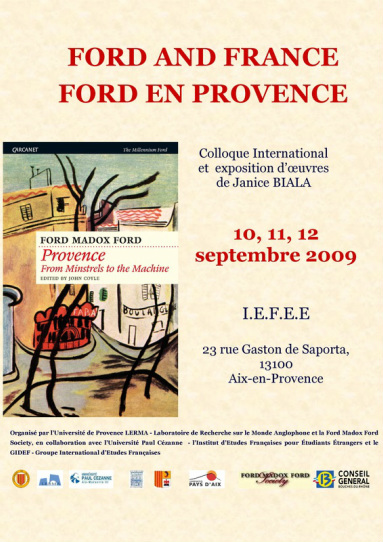 Click to download the poster
Click to download the poster
The Society’s conference ‘Ford in France/Ford en Provence’ was held in Aix-en-Provence from the 10th to 12th September 2009. Thanks are due to Professor Claire Davison-Pégon for organising it locally for the University of Provence, our partner, and to Dr Gil Charbonnier for both hosting the conference and providing insight into Ford’s French connections.
Gil Charbonnier opened the doors of the Institute for French Studies, a charming hôtel particulier opposite the Cathedral, complete with inner courtyard and Provençal fountain, to welcome both Jason Andrew’s exhibition of Biala’s illustrations for Ford’sProvence and our conference.
Jason Andrew’s exhibition of works and photographs by Biala was all the more timely as Carcanet had just re-issued Provence, edited by John Coyle, who in his afterword calls Ford the Lieutenant Columbo of prose writers, an apt comparison. John kindly gave a presentation of the book in French, and Julia K. Gleich gave a memorable dramatised reading of a new selection of letters by Biala which Jason had selected from the Biala Estate.
The keynote lecture was delivered by Professor Hélène Aji, and we were delighted to be joined by Professor Hermione Lee, who delivered the Annual Ford Madox Ford Lecture. Both talks were well attended and very much enjoyed by the audience. While Professor Aji, a distinguished Poundian scholar, devoted her lecture to Pound’s and Ford’s common love for Provence and their letters to and from Toulon, Professor Lee took us to Proust’s funeral with Ford and other literary figures, and talked of his connections with French literary networks while in Paris in the 1920s.
The friendly spirit noted by Jason Harding in Durham continued, and in the frame of mind that is Provence, the quality of the papers addressing the subject of Ford and France proved consistently good, spanning the whole of Ford’s ‘dual life’. They connected his love of France to his beloved grandfather, Ford Madox Brown, and to the love of the troubadours he had inherited from his father, seeing Provence from the English heart of the country, passing from the mud of the trenches to the Mediterranean, from Between St. Dennis and St. George to the later novels, The Rash Actcommanding quite a lot of interest.
A session was held in French to attract prospective publishers – one reason the Ford Society had decided on 2009 for the conference in France being that Ford would then be coming out of copyright. Though publishers did not attend in the numbers that had been hoped for, there has been some positive response since the conference, particularly in the form of interest in Ford’s non-fiction. Meanwhile, the project at hand remains to have Parade’s End published in French for the centenary of the Great War.
The Society now looks forward to mapping more of Ford’s intellectual life, in New York City in September 2010.
Dominique Lemarchal
[Papers from the conference, including the lectures by Hélène Aji and Hermione Lee, will be published in Ford Madox Ford and France, International Ford Madox Ford Studies 10, ed. Dominique Lemarchal and Claire Pégon-Davison (Amsterdam and New York: Rodopi, 2011).]
Gil Charbonnier opened the doors of the Institute for French Studies, a charming hôtel particulier opposite the Cathedral, complete with inner courtyard and Provençal fountain, to welcome both Jason Andrew’s exhibition of Biala’s illustrations for Ford’sProvence and our conference.
Jason Andrew’s exhibition of works and photographs by Biala was all the more timely as Carcanet had just re-issued Provence, edited by John Coyle, who in his afterword calls Ford the Lieutenant Columbo of prose writers, an apt comparison. John kindly gave a presentation of the book in French, and Julia K. Gleich gave a memorable dramatised reading of a new selection of letters by Biala which Jason had selected from the Biala Estate.
The keynote lecture was delivered by Professor Hélène Aji, and we were delighted to be joined by Professor Hermione Lee, who delivered the Annual Ford Madox Ford Lecture. Both talks were well attended and very much enjoyed by the audience. While Professor Aji, a distinguished Poundian scholar, devoted her lecture to Pound’s and Ford’s common love for Provence and their letters to and from Toulon, Professor Lee took us to Proust’s funeral with Ford and other literary figures, and talked of his connections with French literary networks while in Paris in the 1920s.
The friendly spirit noted by Jason Harding in Durham continued, and in the frame of mind that is Provence, the quality of the papers addressing the subject of Ford and France proved consistently good, spanning the whole of Ford’s ‘dual life’. They connected his love of France to his beloved grandfather, Ford Madox Brown, and to the love of the troubadours he had inherited from his father, seeing Provence from the English heart of the country, passing from the mud of the trenches to the Mediterranean, from Between St. Dennis and St. George to the later novels, The Rash Actcommanding quite a lot of interest.
A session was held in French to attract prospective publishers – one reason the Ford Society had decided on 2009 for the conference in France being that Ford would then be coming out of copyright. Though publishers did not attend in the numbers that had been hoped for, there has been some positive response since the conference, particularly in the form of interest in Ford’s non-fiction. Meanwhile, the project at hand remains to have Parade’s End published in French for the centenary of the Great War.
The Society now looks forward to mapping more of Ford’s intellectual life, in New York City in September 2010.
Dominique Lemarchal
[Papers from the conference, including the lectures by Hélène Aji and Hermione Lee, will be published in Ford Madox Ford and France, International Ford Madox Ford Studies 10, ed. Dominique Lemarchal and Claire Pégon-Davison (Amsterdam and New York: Rodopi, 2011).]
Ford Madox Ford and Editing
University of Durham, 12-14 September 2008
University of Durham, 12-14 September 2008
|
The Ford Society enjoyed a productive, varied and fascinating conference in Durham. Thanks are due to Jason Harding for organising this event, and to the English Department and the University too for their support. The Annual Ford Madox Ford Lecture was given by Philip Horne, on Henry James, Ford and the English Review. The Keynote Lecture, by Martin Stannard, dealt with the subject of editing Ford. Other papers offered new insights on Ford’s editorial relationships, the English Review and modernism, and Ford’s biography and editing. Poetry readings and an excellent conference dinner provided entertainment in the evenings, and our location, almost next to the cathedral itself, was an added bonus. Jason is going to provide a more detailed write-up of the event once he has caught up with the deadlines the conference took him away from, but I should like to re-iterate my thanks to him here, and to all those who took part and contributed to the success of the event.
Sara Haslam |
Ford Madox Ford: Visual Arts and Media
Genova, 17-19 September 2007
Genova, 17-19 September 2007
The conference on ‘Ford Madox Ford: Visual Arts and Media’ was held from the 17th to 19th September 2007. It was promoted by the Dipartimento di Scienze della Comunicazione Linguistica e Culturale (Facoltà di Lingue e Letterature Straniere of Genova), the Università di Genova and the Ford Madox Ford Society. The baroque Palazzo Balbi Cattaneo, Aula Magna, Via Balbi, 2, provided a wonderful setting.
The highlights of the event were the Annual Lectures delivered by two outstanding authors, A. S. Byatt and Colm Tóibín, whose presence made the conference an even more memorable event. Byatt spoke on the discoveries of neuroscience concerning the perception of colour and explained how, as a writer, she can experience colour in either a painterly or non-painterly manner. She also discussed Ford’s use of the primary colours of folk tales in The Fifth Queen and Parade’s End. Tóibín, whose novel about Henry James, The Master, was published to acclaim in 2004, suggested a reading of The Good Soldier in the light of the fascination with double lives that Ford shared with other writers of the period: Oscar Wilde, Robert Louis Stevenson and Joseph Conrad. This duplicity, said Tóibín, finds its main avatar in Leonora who, he argued, is the most important Irish character since Trollope.
A variety of papers by international scholars provided new insights into Ford’s lifelong association with the arts and ranged widely across Ford’s production: his monographs on Hans Holbein, D. G. Rossetti, Ford Madox Brown and the Pre-Raphaelites; his interest in portraiture as a painterly and literary genre; his avant-garde representation of war in Parade’s End; his connections with Stella Bowen and Janice Biala; his fascination with modernist painters like Matisse. Some papers focused on Ford’s involvement with a wide range of media and technologies: craftwork, furniture, cartography, the telephone, photography, and early cinema.
The conference was given coverage in the local newspaper, Il Secolo XIX (21 Sep. 2007), and, most notably, in the Times (24 Sep. 2007) with an article by Richard Owen, the correspondent in Rome.
It was a well-attended event, and the Society was pleased to see graduate and postgraduate students attending and contributing, several of whom were new to the Society’s activities. The tight focus of the conference encouraged everyone to join in a fruitful debate. Its proceedings will be edited by myself and published in Ford Madox Ford: Visual Arts and Media (2009), volume 8 of International Ford Madox Ford Studies (IFMFS).
The conference participants had an opportunity to visit the old town and port as well as some of the city’s art galleries. They also enjoyed an appetising welcome cocktail at The Old Port and a delicious conference meal in the atmospheric Garibaldi Histoire Café in the heart of the Renaissance city centre, next to the Palazzo Rosso where Conrad’s novel Suspense is largely set.
Dr Laura Colombino
Conference Organiser
See also article at Times Online: http://entertainment.timesonline.co.uk/tol/arts_and_entertainment/books/article2517677.ece
And an article in Il Secolo XIX (in Italian).
The highlights of the event were the Annual Lectures delivered by two outstanding authors, A. S. Byatt and Colm Tóibín, whose presence made the conference an even more memorable event. Byatt spoke on the discoveries of neuroscience concerning the perception of colour and explained how, as a writer, she can experience colour in either a painterly or non-painterly manner. She also discussed Ford’s use of the primary colours of folk tales in The Fifth Queen and Parade’s End. Tóibín, whose novel about Henry James, The Master, was published to acclaim in 2004, suggested a reading of The Good Soldier in the light of the fascination with double lives that Ford shared with other writers of the period: Oscar Wilde, Robert Louis Stevenson and Joseph Conrad. This duplicity, said Tóibín, finds its main avatar in Leonora who, he argued, is the most important Irish character since Trollope.
A variety of papers by international scholars provided new insights into Ford’s lifelong association with the arts and ranged widely across Ford’s production: his monographs on Hans Holbein, D. G. Rossetti, Ford Madox Brown and the Pre-Raphaelites; his interest in portraiture as a painterly and literary genre; his avant-garde representation of war in Parade’s End; his connections with Stella Bowen and Janice Biala; his fascination with modernist painters like Matisse. Some papers focused on Ford’s involvement with a wide range of media and technologies: craftwork, furniture, cartography, the telephone, photography, and early cinema.
The conference was given coverage in the local newspaper, Il Secolo XIX (21 Sep. 2007), and, most notably, in the Times (24 Sep. 2007) with an article by Richard Owen, the correspondent in Rome.
It was a well-attended event, and the Society was pleased to see graduate and postgraduate students attending and contributing, several of whom were new to the Society’s activities. The tight focus of the conference encouraged everyone to join in a fruitful debate. Its proceedings will be edited by myself and published in Ford Madox Ford: Visual Arts and Media (2009), volume 8 of International Ford Madox Ford Studies (IFMFS).
The conference participants had an opportunity to visit the old town and port as well as some of the city’s art galleries. They also enjoyed an appetising welcome cocktail at The Old Port and a delicious conference meal in the atmospheric Garibaldi Histoire Café in the heart of the Renaissance city centre, next to the Palazzo Rosso where Conrad’s novel Suspense is largely set.
Dr Laura Colombino
Conference Organiser
See also article at Times Online: http://entertainment.timesonline.co.uk/tol/arts_and_entertainment/books/article2517677.ece
And an article in Il Secolo XIX (in Italian).
Ford Madox Ford: Literary Networks and Cultural Transitions
The Ford Madox Ford Society held its 2006 conference at the Birmingham and Midland Institute on 14-15 September, in conjunction with the University of Birmingham. The conference topic was ‘Ford Madox Ford: Literary Networks and Cultural Transitions’, and a variety of papers were presented on Ford’s connections with a number of his contemporaries (including Wyndham Lewis, Dorothy Richardson, William Carlos Williams and James Joyce) and on some key concepts concerning the rise of modernist literature. The Annual Ford Madox Ford Lecture was given by Zinovy Zinik, who recollected brilliantly his first encounter with Ford’s work in Soviet Moscow during the 1960s; and a fascinating Keynote Address, delivered by Professor David Trotter, discussed some of Ford’s pre-First World War connections, particularly with Lewis and Joyce. The conference participants had a rather brief opportunity to visit some of the city’s art collections, which include works by Ford Madox Brown, and enjoyed a wonderful conference meal at Café Ikon in the heart of Birmingham’s city centre.
The proceedings of the conference will be edited by Andrzej Gasiorek and Daniel Moore and published in Ford Madox Ford: Literary Networks and Cultural Transitions (2008), volume 7 of International Ford Madox Ford Studies.
Daniel Moore
University of Birmingham
The proceedings of the conference will be edited by Andrzej Gasiorek and Daniel Moore and published in Ford Madox Ford: Literary Networks and Cultural Transitions (2008), volume 7 of International Ford Madox Ford Studies.
Daniel Moore
University of Birmingham
|
Registered Charity No. 1084040
Disclaimer |
